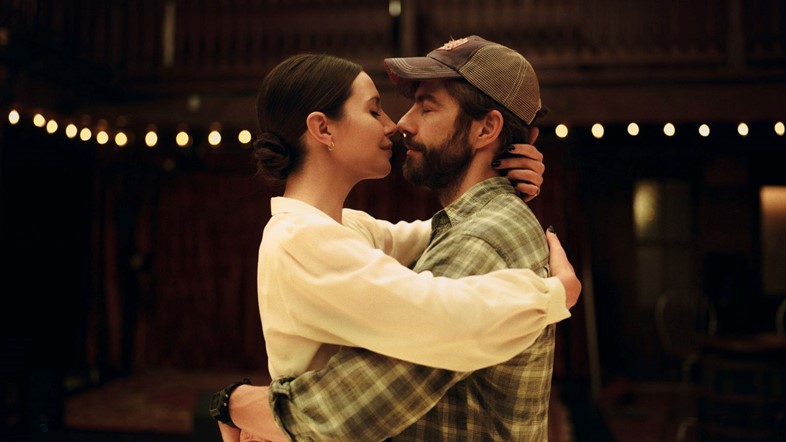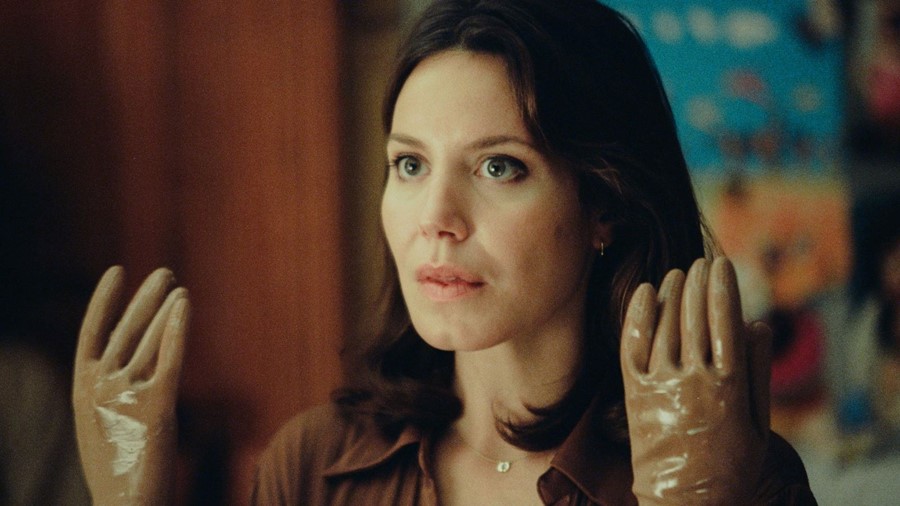As The Nature of Love is released, French-Canadian filmmaker Monia Chokri opens up on her witty and unexpected take on the rom-com genre
Monia Chokri is a French-Canadian filmmaker who thinks about the frame – both the screen and the human one. In her latest feature, The Nature of Love, a smart, dazzling, Québécois romantic comedy about female desire that bursts with witty one-liners, philosophy lecturer Sophia (Magalie Lépine-Blondeau) and bookish Xavier (Francis-William Rhéaume) are a married couple who sleep in separate beds. Not only that, the physical distance between them requires shouting when they converse at night, a gap even more evident when watched in a cinema. However, when Sophia embarks on an affair with a handsy handyman, Sylvain (Pierre-Yves Cardinal), she’s dismayed when the hunk mixes up words, quotes Michel Sardou, and causes offence with outdated terminology. Does size matter? When it comes to a man’s vocabulary, perhaps.
“Writing comes from the subconscious and the unknown,” says Chokri, via email, to AnOther. “I don’t calculate the way I portray things, but I guess that somewhere in me I felt frustrated by the way we create female and male characters. We’re raised by romantic stories that generally include men who are not emotionally available, and women who chase them in order to be picked.” The 41-year-old writer-director describes the typical “bad boy” who “feels nothing” yet is often a movie’s male lead. “Sylvain is in touch with his feelings but is also what we expect of a ‘real man’. Xavier is intellectual but is [removed] from his feelings. I wanted to deconstruct the cliches of what we expect from a man.”
So, too, does Chokri deconstruct the cliches of what we expect from movies about adultery. In The Nature of Love, it’s a woman, not a man, who instigates an affair initially driven by lust: Sophia is drawn to Sylvain’s raw physicality, and it’s an attraction she justifies by quoting Schopenhauer’s claim that “when we see another person as a reproductive force, the feelings of romantic love ensue”. In fact, in front of university students, Sophia quotes the musings of Plato and bell hooks, meaning that, as in Richard Linklater’s Hit Man, the film is accompanied by a Greek chorus of great thinkers. “Every time I start a project, I read what philosophers have to say about it,” says Chokri. “It’s how these ideas can or can’t be applied to reality.”
The film’s gaze, then, is through Sophia’s eyes, which captures Sylvain as a tall, muscular figure who’s often the centre of the camera’s attention; if he isn’t lit like he’s on a magazine shoot, he’s doing stereotypically macho activities involving DIY. “Physical attraction is very personal to each person,” says Chokri. “But, of course, Pierre-Yves is a handsome man. I wanted actors that would embody this idea we have of what a romantic hero would look like so that the majority of viewers would easily fall for them. It was important to have more eroticism in the way I film Sylvain than Sophia.”
Chokri refers to a scene in which Sophia pleasures herself in the shower, using Sylvain for her spank bank. In the flashbacks, the viewer sees Sylvain from Sophia’s point of view: close-ups of his naked skin; his face as he groans with pleasure; his mouth as she grabs his tongue with her fingers. “Sophia becomes someone who desires, not just – like we see most of the time in female characters – someone passive that we desire,” says Chokri. “It’s her point of view. When she masturbates, she has images of Sylvain, not [herself]. I give this example because when I saw The Idol, the character of Lily-Rose Depp fantasises about the sex that she had with the character of The Weeknd. She masturbates, and what we see are images of herself. I found it odd.”

In a supporting role as Sophia’s hyperactive best friend Françoise, Chokri is an experienced performer herself. In 2022’s Babysitter, which Chokri also directed, she plays a comically exasperated mother who ends up marching around a park with a strap-on dildo to peg her husband. Going further back, Chokri came to public attention with key roles in Xavier Dolan’s 2010 and 2012 features Heartbeats and Laurence Anyways. Notably, Chokri’s cinematographer is André Turpin, who brought a pop sensibility to Dolan projects, including Mommy. While Babysitter, an absurd farce, and The Nature of Love, a melancholic drama, are polar opposites in tone, they’re connected by a restless camera style that matches the restless protagonists.
“For this movie, I wanted to be more sensual and romantic in my camera movements,” says Chokri. “I wanted to have a technical cutting that would minimise the shots for a scene – to keep the shots for as long as I could. The [recurring reflections in] mirrors help me make the movements last.” No shots are accidental, and if you sit too close to the front at the cinema, it can be hard to follow the frantic, constantly entertaining mise-en-scène as well as the subtitles at the bottom of the screen. “I wanted to do the opposite of my previous movies, which were more staccato. One reference was the work of Robert Altman, and his use of zooms and dolly shots.”
At this year’s César awards in France, The Nature of Love won best foreign film, even beating Oppenheimer. Fittingly, Chokri’s next film, which she hopes to shoot in 2025, will be set in France. In the meantime, The Nature of Love will surely provoke discussions amongst audiences who will adore, or be aghast, at where Sophia believes her future lies. (“It’s a feeling of vertigo that gives freedom,” says the director of the ending.) Even the premise is, in its own way, provocative. “Anything that touches on women’s freedom is a taboo,” says Chokri. “When a woman puts her needs before others, which men do all the time, she’s likely to get ostracised. We expect women to follow rules that don’t always apply to men.” As for her protagonist’s profession, Chokri notes, “Sophia is a philosopher because I like to create female characters that have the capacity of thinking. It’s another taboo: women who think!”
The Nature of Love is out in UK cinemas now.
